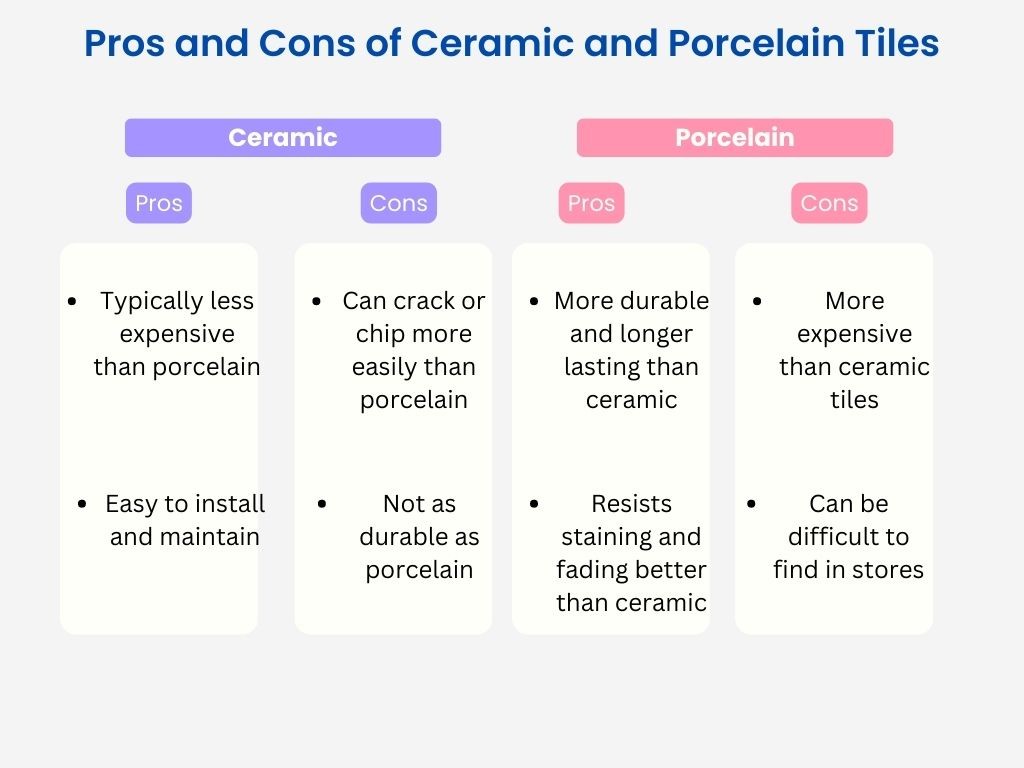There are so many choices to make when it comes to tile. But two of the most popular options are ceramic and porcelain tiles. So, which tile is suitable for your home? In this article, we will compare and contrast these two types of tile, so you can make an informed decision for your home. We will discuss the pros and cons of each type of tile and its durability, appearance, and cost. By the end of this article, you will have learned all you need to know about ceramic and porcelain tiles in order to make the best decision for your home.
What Are Ceramic and Porcelain Tiles?
Ceramic and porcelain tiles are the two main types of tiles. Both are made from clay and other natural materials but differ in composition and manufacturing process.
Ceramic tiles are made from a mixture of clay and other minerals fired in a kiln. Porcelain tiles are made from denser clay, fired at a higher temperature than ceramic tiles. It makes them more durable and less susceptible to staining and moisture damage.
When choosing between the two types of tile, it's essential to consider the intended use. Ceramic tiles are an affordable option for many DIY projects. Still, porcelain tiles are better suited for high-traffic areas or areas that require extra durabilities, such as kitchens and bathrooms.
The Difference Between Ceramic and Porcelain Tiles
Ceramic and porcelain tiles are the most popular flooring materials on the market. Both are made from fired clay, but there are some critical differences between the two that you should be aware of before making a purchase.
Ceramic tiles are typically less expensive than porcelain ones. They're also easier to install than porcelain tiles, making them a good option for do-it-yourselfers. However, ceramic tiles are more likely to chip and crack than porcelain tiles, requiring more maintenance.
Porcelain tiles are more durable and stain-resistant than ceramic tiles, making them a good choice for high-traffic areas and homes with pets or children. They're also less likely to show wear over time. Porcelain tiles can be more challenging to install than ceramic tiles, so hiring a professional is essential if you're considering this type of flooring.
Learn More: Vinyl vs Laminate Flooring - Know which is Better for your Home
Pros and Cons of Ceramic and Porcelain Tiles
A few key differences between ceramic and porcelain tiles can help you decide which option is best for your home. The pros and cons of each type of tile are as follows:

Ceramic Pros:
- Typically less expensive than porcelain
- Easy to install and maintain
Ceramic Cons:
- Can crack or chip more easily than porcelain
- Not as durable as porcelain
Porcelain Pros:
- More durable and longer lasting than ceramic
- Resists staining and fading better than ceramic
- Has a higher density, making it more resistant to water absorption
Porcelain Cons:
- More expensive than ceramic tiles
- There are some stores that sell it, but it can be hard to find
Which Is Better for Your Home?
When choosing tiles for your home, you may wonder whether to go for ceramic or porcelain. Both have advantages and disadvantages, so it's important to know what these are before deciding.
Ceramic tiles are made from natural clay that is fired in a kiln. They are then glazed and can be printed with any design. Porcelain tiles are also made from natural clay but fired at a higher temperature than ceramic tiles. It means that they are harder and more durable.
One advantage of ceramic tiles is that they are cheaper than porcelain tiles. They are also easier to install, as they can be cut with a standard tile cutter. Porcelain tiles are more expensive and require special tools for cutting and installation.
Another advantage of ceramic tiles is that they come in various colours and designs. You can find them in almost any colour you can imagine, and they can be printed with any design you want. Porcelain tiles are available in fewer colours and designs, although there is still an excellent selection.
One disadvantage of ceramic tiles is that they are not as hard-wearing as porcelain tiles. They can chip and crack if installed incorrectly or receive a lot of wear and tear. Porcelain tiles are much more durable and resistant to chipping and cracking.
A disadvantage of ceramic tiles is that they can be slippery when wet. It means they are not suitable for use in areas with a risk of slippings, such as bathrooms or kitchens. Porcelain tiles have a rougher surface, which makes them less slippery.
So, which tile is better for your home? Depending on your unique needs and preferences, it will vary. If you want a tile that is cheaper and easier to install yourself, then ceramic tiles are a good option. If you need a more durable tile and are less likely to chip or crack, then porcelain tiles are a better choice.
Read More: Different Types of Sports Flooring - Indoor & Outdoor
Things to consider While Choosing Tiles for Your House
You should consider a few things when choosing tiles for your home. The first is the tile's durability. Ceramic and porcelain tiles are durable, but ceramic may be more susceptible to chipping and breaking than porcelain. If you have young children or pets, you may want to choose porcelain tiles for your floors.
The second thing to consider is the tile's design. Both ceramic and porcelain tiles come in various colours, patterns, and styles. You'll want to choose tiles that complement the overall design of your home. If you have a modern home, you may want to choose sleek, simple tile designs. If you have a more traditional home, you may want to choose ornate, detailed tile designs.
The third thing to consider is the tile's installation. A professional installer or do-it-yourselfer can install ceramic and porcelain tiles. If installing the tiles yourself, read the instructions carefully and follow them precisely. Choosing the suitable adhesive and grout for your particular project is also essential.
Finally, consider your budget when choosing ceramic or porcelain tiles for your home. Both types of tile can be quite expensive, so it's essential to set a budget before you start shopping. Once you've considered all of these factors, you'll be able to narrow down your choices and select the perfect tile for your home.
Conclusion
We hope this article has helped you understand all you need to know about ceramic and porcelain tiles. As you can see, each type of tile has its unique benefits that make it ideal for different applications. When deciding which type of tile to use for your next project, keep these critical points in mind so that you can choose the right material for the job.






